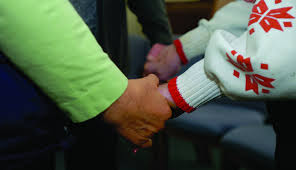Think back to the moment we first walked into an OA meeting. We finally gave up outwitting or toughing out our disease. Our eating discouraged us. The shape of our body discouraged us. So did our emotional health.
We come into OA on a losing streak. None of us thought that, gee, OA might be a fun place to meet friends and network. We came because our lives, as we were living them, were pretty lousy: chained to food like a slave to their master. None of us had the foggiest idea what to do, we just wanted a place that could help us where no one else could before. So when we went to our first meeting, what were we looking for? Why, hope of course! All we wanted was a tiny glimmer, a glinting of shining hope. Half a ray of hope, even an eighth of a ray, would have been infinitely more hope than we walked in with.
But how do newcomers (or current members) get that hope? In our first meeting, we were probably confused by all the terminology chucked around: abstinence, food plan, Higher Power, unmanageability. What’s it got to do with stopping the uncontrollable urge to eat? Then we hear someone describe their journey. We hear in them what’s familiar: the obsession, the physical need for our binge foods, the fear and self-doubt. We hear in another’s words the lonely secrets of our food behaviors.
But the problem isn’t the only thing we need to feel hopeful. If everyone shared only about the problem, then it’s just talking. What we felt and heard was that OA has a solution. We didn’t necessarily know what “Twelve Steps” means, but we hear people talking about how their compulsive eating has been arrested. We see that they have achieved some physical recovery. And we imagine ourselves in their place. “If they were like that before, and they are getting better, then I can too!”
If we heard hope, then we probably left our first meeting with some lightness in our hearts. Finally, we’ve stumbled into a path forward.
But what if we hadn’t heard hope? What if we didn’t hear that there was a solution? What if we mostly heard about the problem? Or sharing that’s mostly retellings of the difficult problems of the past week? Would we have stuck around?
Just as newcomers need to hear hope, current members, no matter where we are in our journey of recovery, need to hear hope too. Even more important we desperately need to share hope. Step 12 tells us that we are to carry the message of hope to those who still suffer. The Big Book tells us explicitly and implicitly that we must share what happened (the problem), what we did (the solution in OA), and what we’re like now (how we’ve been changed by OA). This isn’t optional, it’s foundational to maintaining our spiritual condition. It’s mirrored again in Tradition 5 that tells us that the primary purpose of any OA meeting is to carry the message to still-suffering compulsive eaters. It’s not about us, it’s about others. It’s about hope!
As practicing OAs, we can ask ourselves three important questions about our sharing:
- What percentage of our sharing is about our problem with food? With non-food life problems? Or is a retelling of events of the past days or week?
- What percentage is about how we are working toward the solution?
- Are we remembering to describe how our lives have changed for the better through OA?
Or we can ask one big question: Do I consistently share so that I feel better or so that someone else in the room feels hope so they can get better?
These answers make all the difference to us as well as the newcomer. If we hear ourselves talking about the solution, we may be more likely to continue reaching for it, reminded of its daily importance to us. Just as the still-suffering compulsive eater may be more likely to stick around and reach for the solution they hear hope from us.
Hope is a diamond for the newcomer, each of our recoveries are its facets, and our Higher Power is the light that sparkles through it.



